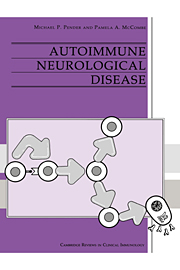Book contents
- Frontmatter
- Contents
- Preface
- 1 Antigen recognition and self–non-self discrimination
- 2 An introduction to neuroimmunology
- 3 Experimental autoimmune encephalomyelitis
- 4 Multiple sclerosis
- 5 Acute disseminated encephalomyelitis
- 6 The stiff-man syndrome
- 7 Experimental autoimmune neuritis
- 8 The Guillain–Barré syndrome and acute dysautonomia
- 9 Chronic immune-mediated neuropathies
- 10 Autoimmune diseases of the neuromuscular junction and other disorders of the motor unit
- 11 Inflammatory myopathies and experimental autoimmune myositis
- 12 Paraneoplastic neurological disorders
- 13 Neurological complications of connective tissue diseases and vasculitis
- Index
Preface
Published online by Cambridge University Press: 22 September 2009
- Frontmatter
- Contents
- Preface
- 1 Antigen recognition and self–non-self discrimination
- 2 An introduction to neuroimmunology
- 3 Experimental autoimmune encephalomyelitis
- 4 Multiple sclerosis
- 5 Acute disseminated encephalomyelitis
- 6 The stiff-man syndrome
- 7 Experimental autoimmune neuritis
- 8 The Guillain–Barré syndrome and acute dysautonomia
- 9 Chronic immune-mediated neuropathies
- 10 Autoimmune diseases of the neuromuscular junction and other disorders of the motor unit
- 11 Inflammatory myopathies and experimental autoimmune myositis
- 12 Paraneoplastic neurological disorders
- 13 Neurological complications of connective tissue diseases and vasculitis
- Index
Summary
This book aims to provide a comprehensive overview of the immunological aspects of autoimmune neurological disease, with particular emphasis on recent research findings. Following introductory chapters on antigen recognition and self–non-self discrimination and on neuroimmunology, the chapters dealing with specific autoimmune neurological diseases are presented in a standardized format with sections on clinical features, genetics, neuropathology, pathophysiology, immunology (including immunopathology, pathogenesis and immunoregulation) and therapy. Each chapter has a concluding section which summarizes the key points and suggests directions for future research. Animal models of autoimmune neurological disease are covered in detail because of their importance in understanding the human diseases. The widely studied experimental autoimmune encephalomyelitis is dealt with first, not only because it serves as a model for T-cell-mediated disease of the nervous system, especially multiple sclerosis, but also because it is the prototype of T-cell-mediated autoimmunity in general. The chapters dealing with disorders of the central nervous system (Chapters 3–6), as well as Chapters 2 and 12, have been written by myself, whereas the chapters dealing with disorders of the peripheral nervous system and muscle (Chapters 7–11) and Chapter 13 have been written by Pamela McCombe. Chapter 1 has been written by Ian Frazer, Professor of Medicine, The University of Queensland, Princess Alexandra Hospital, Woolloongabba, Queensland.
- Type
- Chapter
- Information
- Autoimmune Neurological Disease , pp. viiiPublisher: Cambridge University PressPrint publication year: 1995

